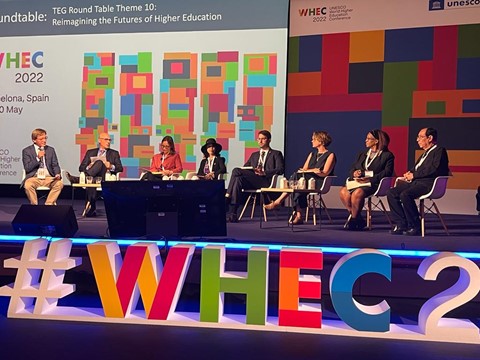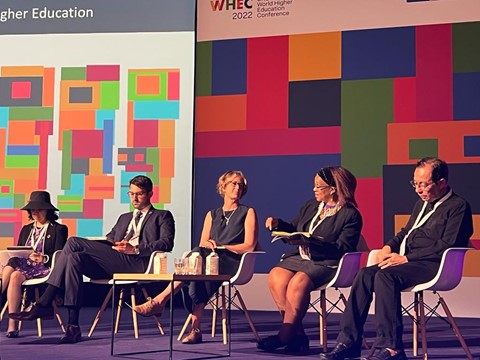WHEC2022 Roundtable: "Reimagining the Futures of Higher Education Together"

Photo: Stefania Giannini, UNESCO’s Assistant Director-General for Education
A Roundtable on Reimagining the Futures of Higher Education was held at the 3rd UNESCO World Higher Education Conference in Barcelona. In the main auditorium, panellists discussed implications of the Sahle-Work Commission Report Reimagining our Futures Together: A New Social Contract for Education, for higher education’s roles in transforming society. The experts expressed a vision of higher education as more inclusive, open, innovative, and resilient, fostering cooperation over competition. Opening Remarks by Stefania Giannini, UNESCO’s Assistant Director-General for Education, highlighted how the Organization promotes international cooperation in and through education. Considering that the future of humanity and the living planet is at risk, she invited the audience to envisage what higher education could – and indeed should – become, thinking beyond the SDG timeline, towards 2050.
H.E. President Sahle-Work Zewde, Chair of the International Commission on Education, explained by video message that, ‘Our report calls for a new social contract for education, one that can help rectify past educational and social exclusions and address uncertain futures’. The President highlighted that, ‘a new culture of collaboration and cooperation within and between institutions is needed’ for more sustainable futures. Another crucial point made by the speakers was that education should be a common good. The Report is considered an opportunity to reimagine higher education within this framework.

H.E. Sahle-Work Zewde, President of the Federal Democratic Republic of Ethiopia.
António Nóvoa, Honorary Rector and Professor of Education at the University of Lisbon, stated ‘the Report is an invitation to create a new social contract for education, including higher education, [it] is not a conventional report, a blueprint, a closed document. No, on the contrary, it is an open document’.

António Nóvoa, Honorary Rector and Professor of Education at the University of Lisbon.
Implications of the new social contract for Higher Education
Forging a new social contract requires a whole sector approach, across all levels of education. It should be intersectoral, with support from communities, Higher Education Institutions (HEIs), higher education stakeholders, and local and regional governments to reimagine the futures of education together. This Roundtable highlighted the importance of higher education within the new social contract. HEIs should encourage active global citizenship and democracy, empowering people to engage in discourse and think freely, shaping the youth of the future. This is a vision that could involve democratically elected students’ and teachers’ unions - two groups between which education takes place.
Experts considered the three key questions in the Sahle-Work Commission Report: What should we continue doing? What should we abandon? And what should we creatively reimagine? Thinking about what to abandon, Yume Yamaguchi of the United Nations University, stated, ‘higher education is ... a key area to connect, to break the siloes, and to bring the changes beyond the SDG4’, emphasising the need for interconnectedness. Similarly, Sebastian Berger of the Global Student Forum, said that we need a ‘multidimensional approach with teaching and learning, and research and innovation’. He discussed the importance of higher education for addressing of wider issues, such as climate change, and ensuring adequate funding for these processes. This can also allow for evidence-based research and policy formulation to be reflected in education. Throughout the Roundtable, experts stressed that education is a common good, not a commodity. The importance of the right to education for all throughout life, and a new culture of collaboration, creativity, imagination and innovation, were highlighted as important steps to transform higher education. Hilligje van’t Land, of the International Association of Universities, told the audience that the future of higher education should not valorise competition, but ‘if it is based on cooperation [it] will allow us to go in the right direction to build together a more sustainable and better future’.

From left to right: Sobhi Tawil, Francesc Pedro, Hilligje Van’t Land, Yume Yamaguchi, Sebastian Berger, Keri Facer, Mpine Makoe, Dzulkifli Abdul Razak.
Reimagining Higher Education for Sustainable Futures
Experts considered the value – and policy potential – of the process of envisaging desirable futures of higher education, by reimagining why, how, what, where, and when we learn in higher education. They shared their experiences and visions of higher education towards 2050, highlighting key ideas of plural futures, humanism and the value of futures thinking. Dzulkifli Abdul Razak, of the International Islamic University Malaysia, emphasized the need to be ‘better human beings’ and to ‘humanize education’, with other experts agreeing that we need to look at the individual person as part of the collective. These notions can help to reshape higher education for transformed futures for the benefit of societies, as well as for individuals within those societies.
Remodelling universities into community and research-based institutions, which support sustainable development and the co-construction of knowledge was explored. Keri Facer, of the University of Bristol, observed that ‘the key challenge is to recognize that the world will change, and higher education will change, and hard challenges require more than wishful thinking’. In order to reach the futures we want, experts stressed the need for stakeholders, including youth and policymakers, to begin listening, visioning, and ultimately actioning, desirable futures of higher education – noting that if we do not take on this task, then someone else will. Reimagining the futures can offer relevant, responsive and resilient practices in different contexts.
A key message was the need to ‘decolonize education’ and think about what works in individual and unique contexts, for example, considering economic needs, the needs of the community, and what needs to be done to become the people we want to be. In order to do this, we must engage with the past without ignorance of knowledges that have been omitted from those accepted in the ‘mainstream’. Mpine Makoe, of the University of South Africa, said, ‘the curriculum needs to be holistic [and] responsive to the needs of the society’, incorporating these delegitimized knowledges. Whilst it is impossible to predict the future, a framework to think about the future is useful in decision-making and can allow us to reach socially just futures for the common good.

From left to right: Yume Yamaguchi, Sebastian Berger, Keri Facer, Mpine Makoe, Dzulkifli Abdul Razak.
Learning to Care
Final reflections from Stefania Giannini reiterated the key points, such as the commitments Higher Education Institutions must make to the past, and to the future; the importance of humanizing education; taking a holistic approach; as well as the notion of sustainability and regenerating society. The ‘decolonization of education’ was picked up in the audience discussion. For example it was noted that at present much research conducted in higher education institutions in Africa does not respond well to local expectations and needs.
The audience was reminded of the past international reports on the Futures of Education, Faure (1972) and Delors (1996), which focussed on ‘learning to be’. The added value of the Sahle-Work Commission Report is in bringing a new perspective around how to transform higher education for sustainable futures. Stefania Giannini stated, ‘the process is as important as the report itself’, in highlighting the value of the visioning process advocated by members of the expert panel. The approach needed to tackle these complexities and future challenges for humanity and the planet is ‘learning to care’.
Photo credits (except for first two photos which are screenshots): Keith Holmes